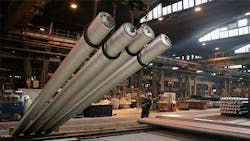Alcoa Expands Titanium Aerospace Components, Acquires TITAL
In a move to strengthen its global position to capture increasing demand for advanced jet engine components made of titanium, Alcoa (IW 500/53) will acquire Germany-based TITAL.
TITAL is a leader in titanium and aluminum structural castings for aircraft engines and airframes. Almost 70% of TITAL’s revenues are expected to come from commercial aerospace sales in 2019. In 2013, the company generated revenues of approximately $96 million, more than half of which came from titanium products.
“This acquisition is the next step in building a powerful aerospace growth engine,” said Klaus Kleinfeld, Alcoa CEO. “As a fast-growing innovator, TITAL will increase our share of highly differentiated content on the world’s best-selling jet engines. “
Alcoa projects a compounded annual commercial jet growth rate of 7% through 2019 and sees a current 9-year production order book at 2013 delivery rates.
The acquisition will establish titanium casting capabilities in Europe for Alcoa, while expanding its aluminum casting capacity. TITAL’s strong connections to European engine and aircraft manufacturers such as Airbus, SNECMA, and Rolls-Royce, will enhance Alcoa’s customer relationships in the region, and beyond.
TITAL’s engineers are known and highly respected experts in manufacturing advanced, single-piece components, often delivered ready for the customer to install, which lower weight and reduce complexity. These products, such as engine gearboxes, nacelles and fan frames, are used on current and next-generation jet engines and airframes. TITAL will add capabilities in casting titanium airframe structures, such as titanium castings for pylons. Pylons mount engines onto airframes and are a highly-engineered part because they must bear the load of the engine and its thrust.
In addition, TITAL is a leader in process technology. It employs advanced techniques needed to manage titanium’s reactive properties, including cold hearth melting and centrifugal and gravity casting. Its teams also use 3D-printed prototypes, enabling customers to test designs and bring a finished product to market faster.
